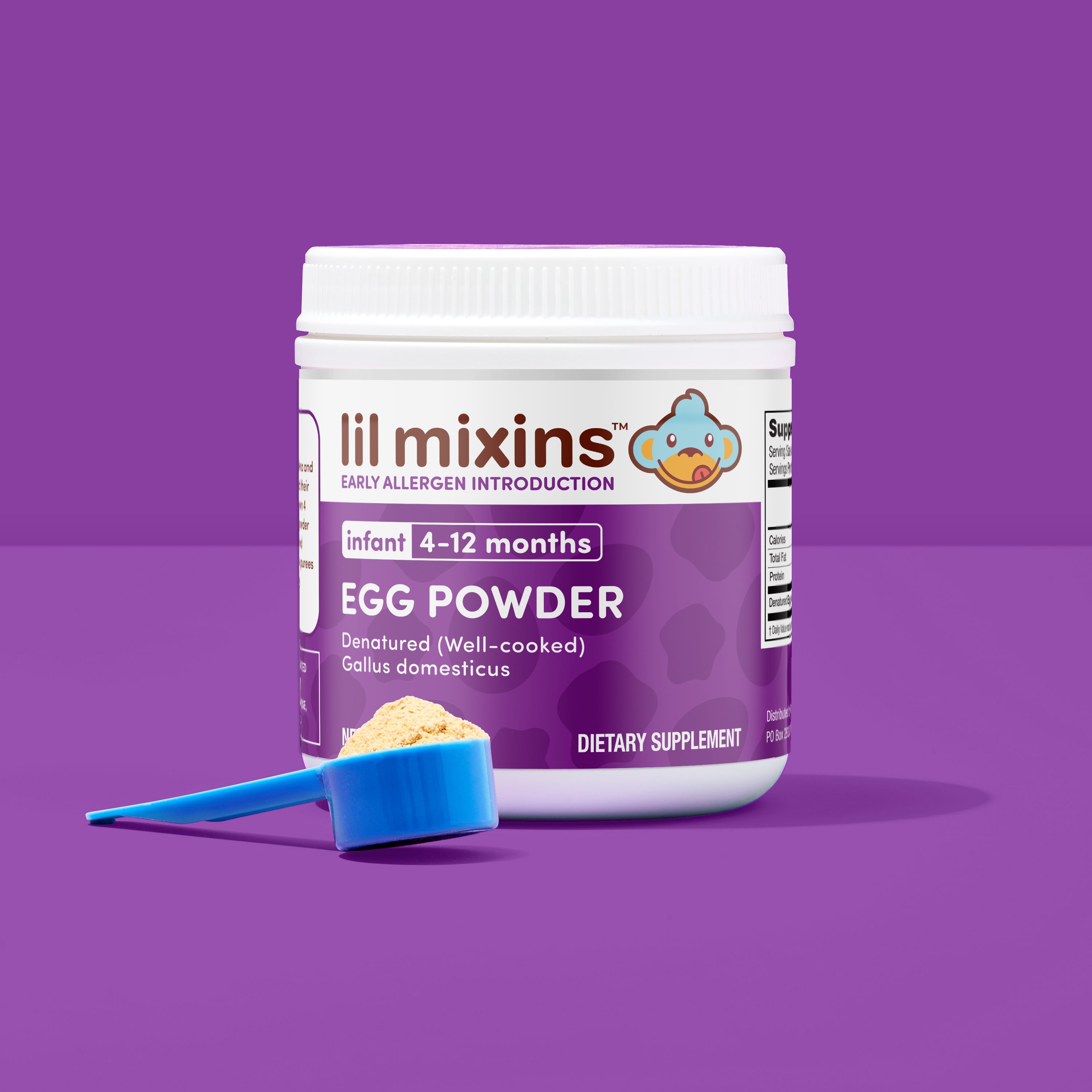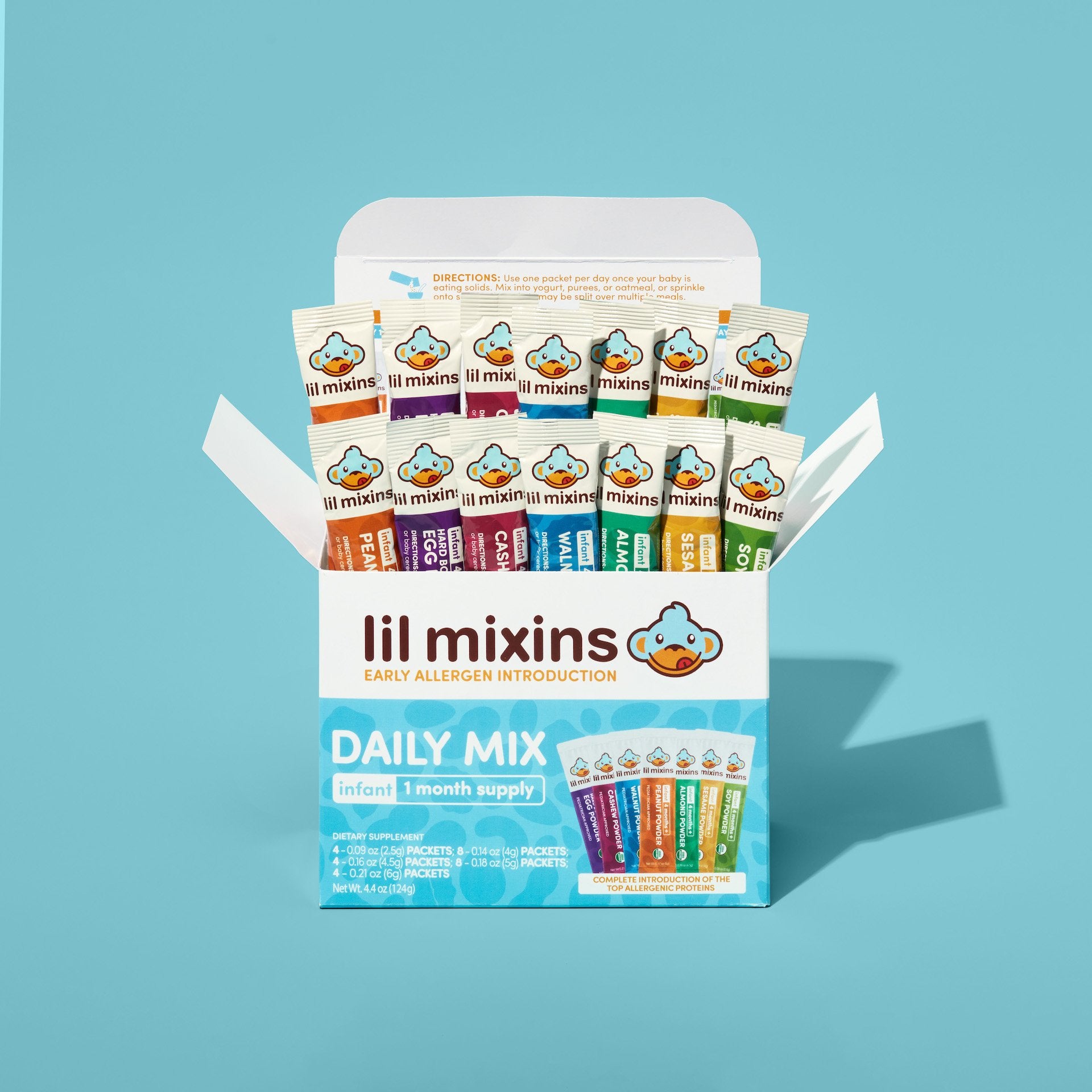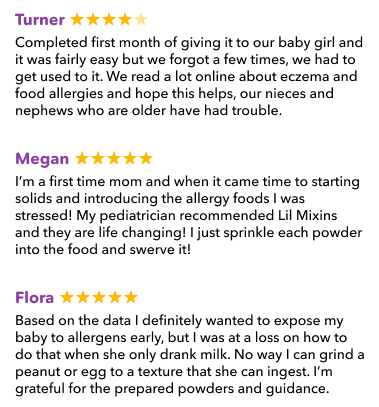Safe Ways to Feed Your Baby Eggs
Everyone agrees that eggs are a great first food for babies. They are nutritious, and eating eggs regularly will prevent most egg allergies from developing.
Here’s a few things you should know before adding eggs into your little one’s diet.
When Can Babies Have Eggs?
Babies can begin eating eggs as soon as they can tolerate solid foods. This means that they are:
- At least 4 months old
- Can hold their head up steady for a long time
- Are showing interest in foods
- Have tolerated one easy food like pureed fruit
The American Academy of Pediatrics and the USDA both suggest that babies begin eating eggs along with solid foods, and that parents do not delay the introduction of eggs.

Shop Hardboiled Egg Mixin 4-Month Supply
How to Introduce Eggs to Baby
Start with hard-boiled eggs, and move to scrambled or fried eggs.
One of the most consistent findings from 10 years of research is that it is 15 times safer to start feeding babies hard-boiled eggs and then move to cooked (scrambled or fried) after 3 months.
For some babies, starting with baked eggs, and then moving to hard-boiled eggs can be necessary.
This is called a ladder, and gently trains your baby to tolerate all the different proteins in an egg.
What does “baked” or "hard-boiled" mean?
For an egg to be “baked” safely for your baby to eat, it must be cooked at 350 degrees Fahrenheit for 30 minutes. For an egg to be "hard boiled", it must be boiled in water for 15 minutes.
This is because there are two major proteins in an egg, both of which cause allergies -- OVA and OVM. A raw or scrambled egg has both OVA and OVM in normal form. But heating an egg actually breaks down the protein. An egg boiled for 15 min has very little OVA and some OVM not broken down, while an egg baked for 30 min at 350F, only has no OVA and very little OVM not broken down. The broken down protein can still train tolerance, but cannot trigger a reaction.
How Do You Feed Babies Baked Eggs?
There are several recipes for muffins that can then be ground up and fed to a baby. Talk to your doctor for a recommended recipe.
How Do You Feed Babies Hard-Boiled Eggs?
Simply add one packet of Lil Mixins Infant Hard-Boiled Egg Powder from the Daily Mix to any baby food! It’s been boiled for 15 mins and then dried to an infant-safe texture.

Shop Daily Mix One-Month Supply
Can You Feed Babies Eggs On Your Own?
If you want to prepare eggs on your own, know that feeding your baby eggs gets easier the older they get. At 4 months old, they can only eat very thin purees. By 6 months, an applesauce-like texture is okay. By 10 months, they can eat scrambled eggs, bits of muffins and baked goods, and by one year old they are ready for most textures.
Preparing Eggs for a 4-8 Months Old Baby
Step 1: Boil the Egg
Bring water to a boil, and boil egg for 15 mins. Remove the yolk, if desired. Mash the egg white into baby's food.
Step 2: Fine Mash or Puree
Add enough water or breastmilk to the cooked egg to soften it and then puree it in a blender. If you are mashing the egg, use a fork or potato masher. You can also use a knife to finely chop the egg and then add the liquid.
Step 3: Mix the Egg with Fruits, Veggies, or Cereal
Some great ideas for foods that mix with eggs are broccoli, apples, peaches, berries, and oatmeal.
Preparing Eggs for a 10-12 Months Old Baby
If your baby is older (8 to 12 months), they can handle scrambled eggs or fried omelettes cut into large palm size pieces. The food no longer needs to be pureed.
Preparing Eggs After the First Birthday
After about a year old, your baby should have good enough pincer movements to eat boiled or scrambled eggs.
Note: babies and children should never eat raw eggs because of the risk of salmonella poisoning.




